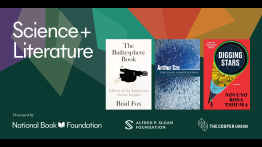2024 Science + Literature Ceremony
Wednesday, March 27, 2024, 6:30 - 8pm

Join the National Book Foundation, Alfred P. Sloan Foundation, and The Cooper Union for the 2024 Science + Literature Ceremony—celebrating the three remarkable 2024 Science + Literature selected titles in fiction, nonfiction, and poetry: The Bathysphere Book: Effects of the Luminous Ocean Depths, The Glass Constellation: New and Collected Poems, and Digging Stars. The program is free and open to the public, and will feature readings and conversation with authors Brad Fox, Arthur Sze, and Novuyo Rosa Tshuma. Emily Raboteau, author of Lessons for Survival, hosts. Books will be available for sale with thanks to our partners at Housing Works, an organization dedicated to ending HIV/AIDS and homeless through lifesaving services and relentless advocacy.
The event will be presented in person at Frederick P. Rose Auditorium at The Cooper Union and livestreamed for readers everywhere. Doors will open at 6:00pm, and the program will begin at 6:30pm EDT. Registration required. Please note this free in-person event is first-come-first-served, and an RSVP does not guarantee admission.
ABOUT THE AUTHORS:
Brad Fox is a writer, journalist, translator, and former relief contractor living in New York. His work has appeared in The New Yorker, The Paris Review Daily, Guernica, and other venues. His novel To Remain Nameless was a finalist for the Big Other Book Award for Fiction and a staff pick at The Paris Review.
Arthur Sze has published 11 books of poetry, including The Glass Constellation: New and Collected Poems and Sight Lines, which won the 2019 National Book Award for Poetry. A new collection, The Silk Dragon II: Translations of Chinese Poetry, is forthcoming. Sze is the recipient of many honors, including a 2022 Ruth Lilly Poetry Prize, a 2021 Shelley Memorial Award, and the Jackson Poetry Prize. He is Professor Emeritus at the Institute of American Indian Arts and lives in Santa Fe, New Mexico.
Novuyo Rosa Tshuma’s latest novel is Digging Stars. Her first novel, House of Stone, won the Edward Stanford Travel Writing Award and the Bulawayo Arts Award for Outstanding Fiction, and was shortlisted for the Orwell Prize for Political Fiction, the Dylan Thomas Prize, and the Balcones Fiction Prize, and was longlisted for the Rathbones Folio Prize. A recipient of a Lannan Literary Fellowship, Tshuma has taught graduate fiction at the Iowa Writers’ Workshop and currently teaches at Emerson College.
ABOUT THE HOST:
Emily Raboteau writes at the intersection of social and environmental justice, race, climate change, and parenthood. Her books are The Professor's Daughter; Searching for Zion, winner of an American Book Award; and the forthcoming Lessons for Survival. A contributing editor at Orion Magazine, Raboteau’s essays have appeared and been anthologized in The New Yorker, the New York Times, The Nation, Best American Science Writing, Best American Travel Writing, and elsewhere. She is a professor at the City College of New York (CUNY) and lives in the Bronx.
Science + Literature identifies three books annually, across genres, that deepen readers’ understanding of science and technology, and focuses on highlighting the diversity of voices in contemporary science and technology writing.The 2024 selected titles include narrative nonfiction, a decades-spanning poetry collection, and a cosmos-inspired novel. The 2024 selection committee is Shane Campbell-Staton, Priyamvada Natarajan, Ricardo Nuila (Chair), Brian Teare, and Christina Vizcarra. Science + Literature is made possible by the Sloan Foundation. Read more about the Science + Literature program on the National Book Foundation's website. Sign up for the National Book Foundation's e-newsletter to stay updated on Science + Literature, the National Book Awards, and more.

Located in the Frederick P. Rose Auditorium, at 41 Cooper Square (on Third Avenue between 6th and 7th Streets)




